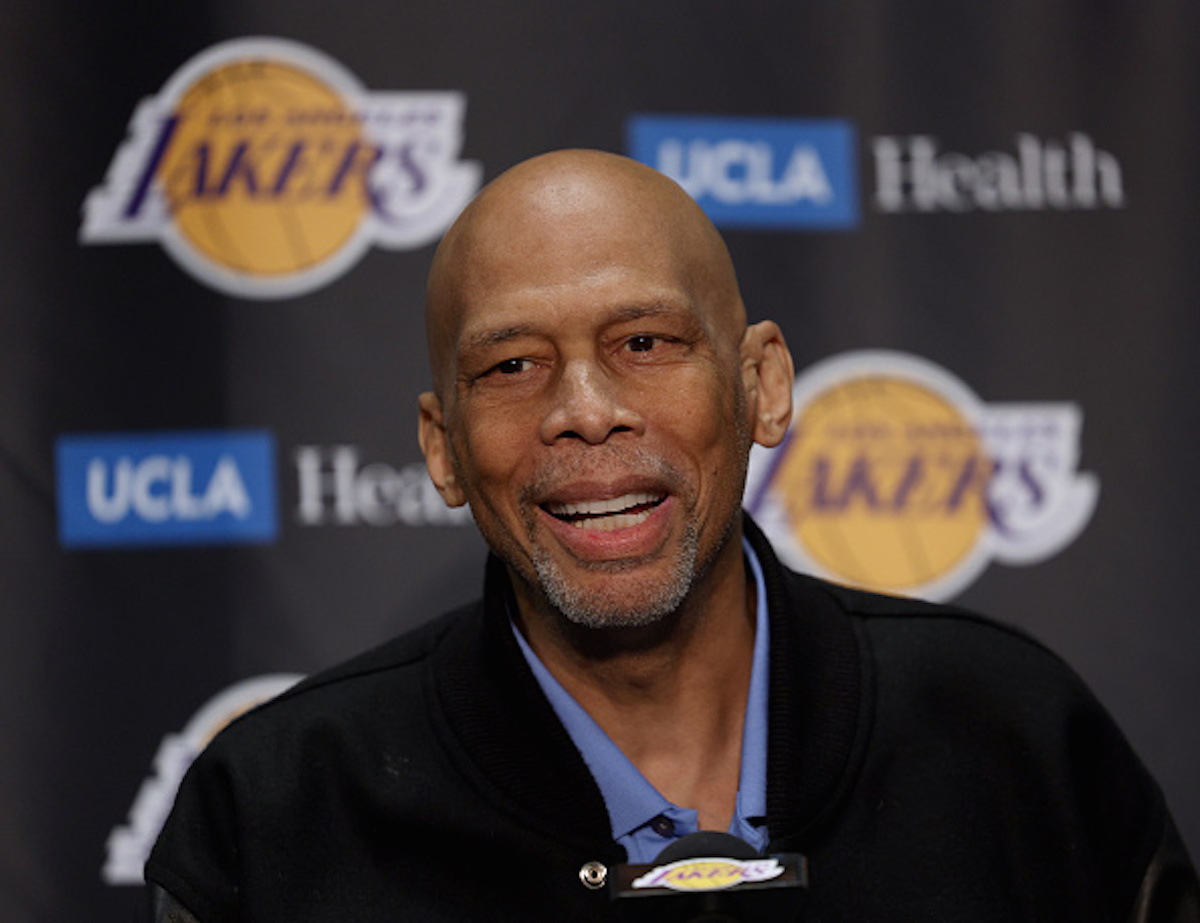Bone Health During Cancer Treatment
- Kareem Abdul Jabbar broke his him during a recent fall and it reminds us how certain cancers and certain cancer treatments have been known to weaken the bones, leading to pain and sometimes breaks and fractures.
- It’s important to know that medications to prevent the loss of bone density do exist and can be prescribed by doctors.
- There are also supplements and exercises your doctor may suggest to keep bones strong as you go through treatment and beyond.
- Over the years, Abdul-Jabbar has beaten prostate cancer after detecting it early.
- He has also survived leukemia and deals with a heart condition called atrial fibrillation, or AFib.
The 76-year-old, a former professional basketball player who dominated the NBA for 20 seasons as a center for the Milwaukee Bucks and the Los Angeles Lakers, accidentally fell at a concert last week and broke his hip—an injury which reminds us how cancer treatment can weaken bones. It’s unclear whether the basketball stars bones happened to be weaker following his cancer battles as it’s relatively normal for a man of Abdul-Jabbar’s age to have hip problems.

Abdul-Jabbar, who was NBA’s all-time scorer until Los Angeles Lakers star LeBron James beat his record, is recovering at UCLA Hospital and in “great care,” his rep concluded.

Kareem Abdul-Jabbar’s Health Battles
Kareem Abdul-Jabbar is a major healthcare advocate after dealing with after dealing with a heart condition and surviving cancer twice. He’s used his platform to educate others about various diseases and conditions as well as disparities in healthcare, as he’s faced many health issues himself.
One of his health battles has been with chronic myeloid leukemia. He was diagnosed in 2008 after dealing with hot flashes and sweats. In 2018, he told People he was prescribed a “targeted group of medication” for the blood cancer that he was still taking daily.
He later explained that “precision medicine was used to focus on the genetic mutation driving my disease.”
“In my case, what we say is I’ve managed it down to a microscopic level,” he told People in 2018. “There are no bad white blood cells, and that’s how we discuss the type of management that I do, which enables me to say that I’m healthy.”
A Deep Look Into The Powerful Drugs for Chronic Myeloid Leukemia: Tyrosine Kinase Inhibitors (TKIs)
Chronic Myeloid Leukemia (CML), also known as chronic myelogenous leukemia, is a type of cancer of the white blood cells. In CML, blast cells (or immature white blood cells) form and uncontrollably multiply and divide. This change in cells creates an abnormal gene called BCR-ABL, which is responsible for turning healthy cells into CML cells.
As the disease progresses, CML cells crowd out healthy cells and eventually build up and spill over into the blood. CML cells can also land in other areas of the body, among them the spleen, intestinal tract, kidneys and lungs.
Inspirational Stories On Resilience
- SurvivorNetTV Presents: ‘Charged’ — Setbacks Help Chef Discover Meaning and Connection
- “200 Steps Today!” — Paraplegic Cancer Survivor Abby Lee Miller Is Proving She’s Resilient By Celebrating Her Physical Therapy Progress
- One Tough Cookie: Resilient 8-Year-Old Who Overcame Ewing Sarcoma Sells More Than 32,000 Boxes of Girl Scout Cookies To Break Record
- SurvivorNetTV Presents: Flourish and Resilient – Never Sell Yourself Short, You’re Stronger Than You Know
- SurvivorNetTV Presents: Resilient — Learning to Overcome
Although CML usually grows fairly slowly, it can also turn into a faster-growing acute leukemia. When this happens, CML may become more difficult to treat. However, with early diagnosis and treatment, experts say the prognosis for the disease is very good.
Abdul-Jabbar is also a prostate cancer survivor. In September 2020, he opened up about being diagnosed 11 years prior.
“I beat it because I was screened and it was detected early,” he said in a video for the Prostate Cancer Foundation.
When Should I Get Tested for Prostate Cancer?
In announcing his previous prostate cancer battle, Abdul-Jabbar also made sure to highlight the systemic racism that perpetuates our healthcare systems.
RELATED: Advocating For Yourself While Navigating the Medical World
“I’ve been fortunate because my celebrity has brought me enough financial security to receive excellent medical attention. No one wants an NBA legend dying on their watch. Imagine the Yelp reviews,” he wrote. “I’m also lucky that one of my sons is an orthopedic surgeon and another is a hospital administrator. Dad gets to nag them for medical advice whenever he wants.
“But while I’m grateful for my advantages, I’m acutely aware that many others in the Black community do not have the same options and that it is my responsibility to join with those fighting to change that. Because Black lives are at risk. Serious risk.”
How the Medical World Can Regain the Trust of Communities of Color
Most recently, Abdul-Jabbar has been dealing with atrial fibrillation, or AFib, which the Mayo Clinic describes as “an irregular and often very rapid heart rhythm (arrhythmia) that can lead to blood clots in the heart.”
Some people with AFib don’t notice any symptoms, but signs and symptoms of the condition can include:
- Sensations of a fast, fluttering or pounding heartbeat (palpitations)
- Chest pain
- Dizziness
- Fatigue
- Lightheadedness
- Reduced ability to exercise
- Shortness of breath
- Weakness
It’s important to always bring up any symptoms you may be having to your doctors. AFib is a serious medical condition that increases a person’s risk of stroke, heart failure and other heart-related complications, so it requires treatment.
Possible treatment options include medications, therapy to reset the heart rhythm and catheter procedures to block faulty heart signals.
“When the doctor first told me that I had AFib, that I had to start doing certain things differently, I didn’t want to believe him,” Abdul-Jabbar said. “I just felt that it was something that was going to go away, and that my lifetime of athletic effort would help me past this point. But, I’m just like anybody else, and I need to treat it the right way.”
In March 2023, Abdul-Jabbar said he had been able to manage his symptoms and avoid any other issues since his diagnosis. “[Hoping] to keep it that way,” he has been eating healthy, drinking more water and taking his medicines. “If I can do that, I can maintain my healthy lifestyle,” he said.
How To Strengthen Bones During or After Cancer Treatment
We don’t know if Kareem Abdul Jabbar’s battle with cancer somehow contributed to his broken bone, but we do know that some types of cancer treatment can weaken the bones.
Certain cancers and cancer treatments can affect bone health and leave survivors more susceptible to pain, fractures and breaks.
How to Cope With Bone Pain from Cancer
Some cancers, like multiple myeloma, have direct affects on the bones due to the nature of the disease. Others, like breast, prostate and lung cancers, may require treatment that affects bone health. For example, women who get breast cancer treatment that reduces the levels of estrogen in their body are at a higher risk for osteoporosis — or a weakening of the bones. These cancers also tend to spread to the bone if they progress and become metastatic. When cancer spreads from one organ to the bones the cancer becomes classified as stage IV or metastatic cancer.
Other cancer treatments have been known to weaken bones or affect balance, which can lead to falls that result in bones fracturing or breaking.
The National Osteoporosis Foundation notes that the following cancer treatments can have negative affects on bone health:
- Aromatase inhibitors — These drugs block aromatase from turning androgen into estrogen in the body, resulting in decreased estrogen levels and an increased risk of osteoporosis and fractures.
- Androgen Deprivation Therapy — This hormonal therapy given to some men with prostate cancer may result in bone density loss and fractures.
- Chemotherapy — Chemotherapy can affect the bone health in women when it shuts down the ovaries and causes early menopause in premenopausal women. Like aromatase inhibitors, chemotherapy that causes early menopause through ovarian inhibition leads to lower estrogen levels.
- Oophorectomy or medically shutting down ovaries — Removing ovaries surgically or medically shutting them down can lead to bone density issues.
Fortunately, there are interventions that can be made to keep bones healthier and reduce the risk of weakening or breaks. There are both medications and lifestyle changes that a doctor may recommend to keep bones strong and healthy.
Dr. Geoffrey Oxnard, a thoracic oncologist at Dana-Farber Cancer Institute, shares some tips for staying healthy while you go through cancer treatment.
A doctor may prescribe certain medications to help with bone loss or bone pain from metastatic cancer, according to the American Society of Clinical Oncology (ASCO), including:
Treatment for bone loss often involves the use of bone-modifying drugs. These drugs slow the rate of bone thinning. They may also reduce new bone damage and promote healing. People who have bone pain from metastatic cancer also often receive these drugs. Bone-modifying drugs include:
- Bisphosphonates — These drugs block cells that destroy bones, which are called osteoclasts. By blocking these cells, the drugs help bone-building cells to work more effectively.
- RANK ligand inhibitors — These drugs can be used to manage osteoporosis and prevent bone fractures and breaks and are sometimes used in patients with multiple myeloma or bone metastasis. They work by binding to a protein that is essential for bone-destroying cells and inhibiting those cells from properly functioning.
There are also many lifestyle adjustments your doctor may recommend, including both supplements and specific types of exercise, according to ASCO.
Managing bone loss and pain may include a combination of the following:
- Supplements — Your doctor may recommend taking vitamin D and calcium supplements, as both contribute to healthy bones
- Exercise — Weight-bearing exercise in particular, such as walking, dancing, using an elliptical, and low-impact aerobics, contribute to overall bone health. This type of exercise also helps build muscle, which can help with balance
- Maintaining a healthy weight — Keeping a nutritious diet and maintaining a healthy weight is important to bone health
Dr. Sairah Ahmed, of MD Anderson Cancer Center, Explains the Role Diet and Exercise Plays in Cancer Treatment
The treatment recommendations may vary depending on if cancer has spread to the bones, or metastasized, and what a person’s overall health is. Some patients may be able to incorporate more exercise into their daily routines, while others should be sure to keep intensity levels low.
Some cancer survivors have used other natural remedies, such as medical marijuana, to cope with pain when cancer spreads to the bones and had great success. Many patients turn to cannabis after running into problems with more traditional pain medications, Dr. Junella Chin, an integrative cannabis physician, told SurvivorNet in a previous conversation.
For many, this approach can help alleviate pain while reducing inflammation at the same time, Dr. Chin said.
Contributing: SurvivorNet Staff
Learn more about SurvivorNet's rigorous medical review process.

